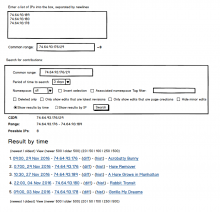There are numerous tools and guides to calculate a range, but very few that let you see contributions from that range. To my knowledge, we currently have XTools which only supports IPv4, and the Contribsrange gadget which does support IPv6 but only via wildcard. E.g. 2601:646:8200:7d30:* as opposed to 2601:646:8200:7d30::/64, lending confusion on whether the IPs you are seeing are within the target range, and how much collateral damage you'd cause by blocking that range. Both tools aren't particularly stable or reliable.
There are some tricks with IPv6, e.g. some ISPs are known to allocate a single customer to a /64 range, so we can usually safely do a rangeblock there, but this is not obvious to many admins. Having a tool to verify your target range is correct, and be able to carefully spot check the edits, would make a world of a difference and open the door for admins who are less comfortable with range blocks. CheckUsers I believe would especially find such a tool beneficial (see also T21796).
Requirements for version 1:
- The tool will operate at Special:RangeContributions. Instead of typing in a single IP address, you simply type in the range.
- If the data is limited to a certain number of days, this should be mentioned in the UI.
- The results will mimic how the current gadget works, by showing a list of the IPs within the range with expand/collapse to show the individual contributions.
- The interface should also show some metadata about the range: highest and lowest IP address, number of IP addresses included
- Both IPv4 and IPv6 addresses should be supported.
- Support both CIDR and wildcard searches (latter is quite easy)
- Search limit for CIDR with IPv4 is up (down?) to /16 and for IPv6 to /19, beyond which searches won't be supported and an error message is displayed.
Wireframes
Results by time:
Results by IP:

